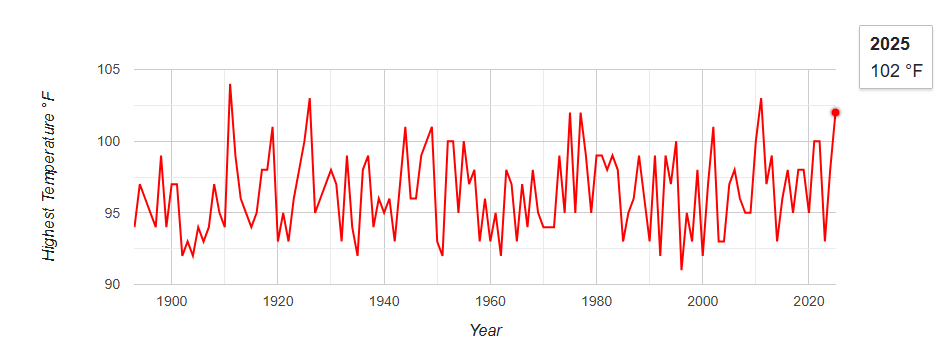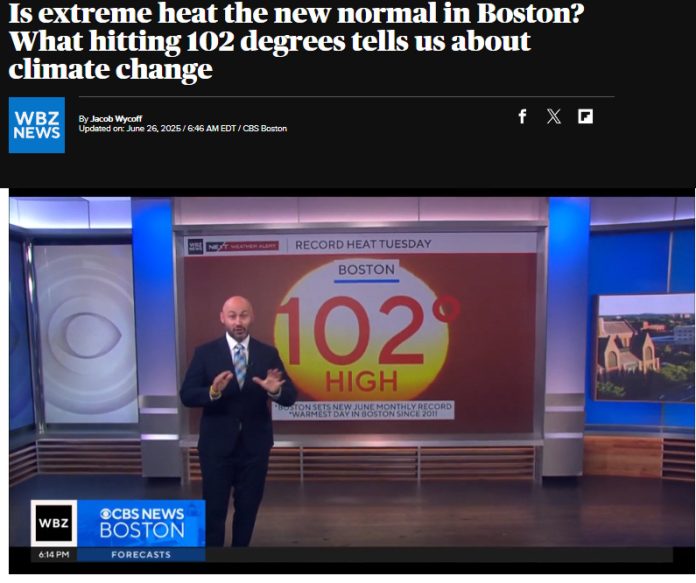In the CBS Boston (CBS-B) article titled “Is extreme heat the new normal in Boston? What hitting 102 degrees tells us about climate change,” Jacob Wycoff claims that Boston’s recent heat wave is a symptom of climate change and the “new normal.” This is misleading. In fact, long-term temperature records do not support the notion that heat waves are becoming more intense or more frequent in Boston or across the United States. Historical weather data shows that extreme heat events in Boston are neither unprecedented nor evidence of a climate emergency. The notion that a few hot days in June are proof of a systemic climate shift is simply not supported by the broader climate record.
“What used to be ‘unusual’ is fast becoming our new normal,” Wycoff writes. “And if we don’t act to slow warming, this kind of heat won’t be the exception, it’ll be the expectation.
“If greenhouse gas emissions remain unchecked, Boston’s average summer highs could rise by 9 degrees by 2100,” says Wycoff.
Wycoff’s story, as is usually the case in mainstream media stories about climate change, promotes speculative model projections, while ignoring real world data and trends to the contrary.
It’s a familiar tactic: choose the most aggressive, worst-case emissions scenario and present it as destiny. Climate Central, the source for much of the CBS-B story, uses computer model projections based on RCP 8.5, for example. Yet as noted on Climate Realism, even the Intergovernmental Panel on Climate Change (IPCC) has stepped back from emphasizing RCP 8.5 as a likely pathway, recognizing that is implausible if not impossible.
This climate alarmist framing glosses over essential context: heat waves like the one Boston just experienced have happened before, well before recent increase in carbon dioxide emissions, and are often the result of local urbanization effects—not global climate trends.
Let’s start with the basic fact that the recent heat in Boston, while certainly hot, is far from unprecedented. According to the National Weather Service data, Boston hit a record high of 102 degrees for June on June 24, 2025. But historical data shows that Boston has experienced significantly high temperatures long before modern climate anxieties took hold. Boston’s previous record June temperature of 100℉ was June 6. 1925, 100 years of global warming ago. The highest all time ever recorded temperature in Boston was 104°F in July 1911, followed by 103°F in July 1926. The city also saw 102°F temperatures in 1911, 1975, and 1977. You can see these highs in the graph below with the most recent one on the far right in the figure below.

So, if recently increased atmospheric carbon dioxide is responsible for this “new normal” as Wycoff claims, how did these even hotter events happen in the past when carbon dioxide levels were lower? His narrative falls apart in this context.
So, no—extreme heat is not the new normal in Boston. It’s part of a long-standing, intermittent pattern of hot weather events. In fact, the heat experienced in June 2025 didn’t even break Boston’s all-time record. It was simply the hottest June day since 1872, not the hottest day ever.
Nor are extended heatwaves new to Boston. In June 1872, Boston experienced eight days of temperatures above 90°F. Boston also had a multi-day stretch of 100-degree temperatures in July 1911, a heat wave that was deadlier and more extreme than what the city experienced in June 2025. That 1911 event resulted in numerous fatalities across the Northeast, a fact documented well before climate change became the default explanation for every summer hot spell.
The CBS-B article cites Climate Central’s claim that Boston’s overnight summer temperatures have increased by 2 degrees Fahrenheit over the past 50 years. But this trend is almost certainly influenced by the well-known Urban Heat Island (UHI) effect, which causes cities to retain more heat, especially overnight, due to heat-absorbing infrastructure like asphalt, concrete, and buildings. This is not a climate crisis; this is local urbanization.
The UHI effect is well-documented and accounts for much of the localized warming in urban centers. In fact, the National Oceanic and Atmospheric Administration (NOAA) acknowledges that “cities tend to be warmer than rural areas, particularly at night, because buildings, roads, and other infrastructure absorb heat during the day and release it slowly after the sun goes down.”
Boston, like most major metropolitan areas, has undergone significant growth over the last century. The city’s population has grown substantially over the past 70 years. With more people bringing with them the development of more houses, buildings, streets, bridges, concrete, blacktop, machinery, and denser development, all of which contribute to warmer temperatures. The temperature increase isn’t a global phenomenon playing out on a Boston street corner—it’s a localized, urbanized one.
Furthermore, the idea that climate change is singularly responsible for making hot days “six times more common” in Boston is based on computer model forecasting, not measured trends. CBS-B leans heavily on Climate Central’s Climate Shift Index, which is a modeled estimate—not direct measurement—of climate influence. These types of attributions rely on climate models that, as Climate Realism has repeatedly shown, consistently overstate future warming compared to observed reality. Research by Roy Spencer Ph.D., has demonstrated that most climate models overestimate warming by up to 50 percent compared to satellite data.
What CBS-B also fails to mention is that heat-related deaths in the U.S. have been declining, not increasing. Thanks to modern air conditioning, improved healthcare, and public awareness, society is far more resilient to heat than it was a century ago. According to a 2022 study published in The Lancet, cold weather still kills significantly more people than heat does.
The CBS-B story is a prime example of lazy climate reporting. It cherry-picks recent temperatures, ignores over a century of weather history, and repeats activist talking points without challenge. CBS-B’s failure to carry out basic fact checking resulted in a story that was alarmingly misleading. The story is an example of the type of “journalism” that is eroding the public’s trust in journalists and mainstream media outlets they report for.
















